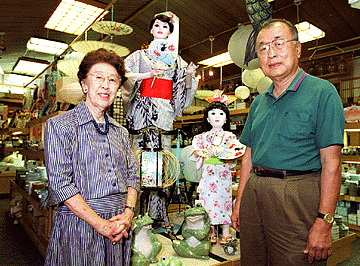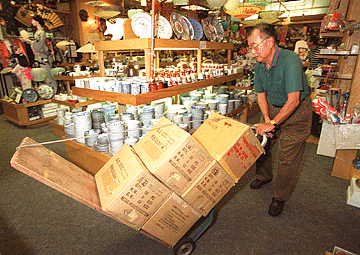
Yoshiko Nishimura and Robert Iida of Iida Store at the Ala Moana Shopping center. Photo by George F. Lee, Star-Bulletin

Yoshiko Nishimura and Robert Iida of Iida Store at the Ala Moana Shopping center. Photo by George F. Lee, Star-Bulletin
After all, the import store is crammed floor to ceiling with things Japanese, a touch of home in a sea of swimsuits and surfboards. But the Japanese are often amused when they see colorful cloth koi nobori (carp streamers) hanging from the ceiling.
"It would be like us going to Japan and seeing a Christmas tree decorated in July," explained Warren Nishimoto, whose great-grandfather started Iida's nearly a century ago. Banners of carp, symbols of aspiration and success, are hung in Japan usually only in celebration of Boy's Day.
But, then again, the goods in this store, a fixture at Ala Moana Center since its opening in 1959, are not aimed at the Japanese.
The koi nobori, for example, are popular as windsocks among mainlanders, who, with local folks looking for party favors and gifts, have kept the store in business through four generations, beginning in Chinatown in 1900.
Astoundingly, Iida's has remained in the same prime location - street-level, mauka, Diamondhead corner of what was Phase I of the shopping mall - since the center opened.
It's only among a handful of original tenants remaining, a feat that becomes more notable each year as so many once-established businesses are forced to fold.
Through the years, "We basically been the same," said Robert Iida, grandson of founder Suisan Matsukichi Iida.
Iida's Ala Moana is a 2,500-square-foot bazaar of Oriental wares: Alongside the koi, paper lanterns and umbrellas hang from the ceiling. Teapots sit on and dangle from shelves. There are maneki nekos (cat symbols of good luck and wealth) and red-and-black daruma dolls; little bowls and huge platters; ceramic vases and metal lanterns; chopsticks and soup ladles; delicate dolls in glass cases; woven slippers and wooden getas; hapi coats and sumo T-shirts; and all sorts of toys and novelty items.
Among residents, the store's base has been gifts and favors for special occasions, Iida said, from yakudoshi (41st birthday) parties to Boys' and Girls' Day festivities; from wedding favors to novelty items. Mainland visitors, meanwhile, like the tea sets, platters, lacquerware and silk-screens.
Although "we're not the only slow one (retailer)" these days, Iida acknowledged, "we are not generating as much money as before." That has made the family realize, "maybe we have to change," he said.
Ala Moana Center general manager Dwight Yoshimura agreed. Iida's has been part of a merchandise mix that has worked "in that particular quadrant" of the center, he said. But looking to the future, Iida's has "to fine-tune as to what types of unique Oriental merchandise to carry," he said, indicating a look perhaps beyond Japan to other Asian countries for wares.
Nishimoto observed that besides the economy, changes in values and traditions also have affected business. Many of Iida's customers have come to the store for decades. However, "the younger generation don't necessarily come to our store," Nishimoto said. "There are so many other choices open to them. They don't have that kind of loyalty" like their parents.
But Yoshiko Nishimoto, Warren's mother and Robert's sister, sees "the older ones telling the younger ones about our store."
From Iida's perspective, "I still feel there is a hunger for tradition. So maybe we have to direct our marketing efforts to younger people, based on tradition."
Sitting recently in a tiny, unadorned office in the warehouse, Iida and the Nishimotos traced the history of Iida's from its Chinatown beginning to its move into the state's largest shopping mall.
Matsukichi Iida (also known by his artistic name Suisan) was already an established merchant in Osaka, where relatives continue to run a related business, when he decided to seek his fortune in Hawaii. He opened Suisando Iida on Maunakea Street at the turn of the century, moving mauka, to Nuuanu and Beretania streets, when fire engulfed the Chinatown neighborhood.
His son, Koichi - Robert and Yoshiko's father - eventually left Japan to help his father in Hawaii, assuming control in 1914, shortly after marrying Nobu Wakayama. The couple had eight children: Six daughters followed by two sons. Yoshiko Nishimoto, now 81, is the eldest; Robert, 63, the youngest.

Robert Iida, president of Iida's at Ala Moana Center, trucks 150 coffee cups out the door to be loaded into a customer's car. Iida's grandfather, Suisan Matsukichi Iida, started the store more than 90 years ago in Chinatown. Photo by George F. Lee, Star-Bulletin
During the war years, the store managed to thrive, with Tsuyoshi looking to the mainland instead of Japan for chinaware, plastic ware, stationery and other more American items, Iida recalled.
Koichi Iida eventually returned to Hawaii, but tragically, Nobu died in 1943 while he was still an internee. Koichi Iida and Tsuyoshi Nishimoto both became leaders in the Japanese community, both serving as presidents of the Japanese Chamber of Commerce, with Iida also helping to set up Central Pacific Bank.
When Ala Moana Center opened in 1959, a second Iida's moved in literally on the ground floor. In 1971, the old store and adjoining four-story warehouse were demolished and a new warehouse was built the next year at Hopaka and Pensacola streets.
But even though it long ago moved uptown, Iida's continues to rely on the hard work and family traditions that made the store a downtown landmark for years. Iida's, for example, has about half a million items of inventory, but no computers and no copying machines. "By eye," said Robert Iida when asked how he kept track of everything. "The variety is too big to put into a computer."
In 1994, following the death of his brother-in-law, Robert Iida became company president. Also involved in the business today is his sister, Chiyo Iida; Yoshiko's son, Clyde; and Yoshiko herself.
Warren, meanwhile, says he's the family historian. He's also director of the Center for Oral History at the University of Hawaii.
And when so many other businesses fail, how has Iida's been able to survive nearly 100 years?
Searching for an answer, Yoshiko gestured toward her brother, "Because of these boys," she said, a gesture encompassing her son, husband, father and grandfather.
"We were able to concentrate on customers and give good service," Robert said.
And do they expect to be around in the year 2000 to celebrate Iida's 100th anniversary?
"Yup," said Robert, ever the man of few words. "Because that's how long our lease is."
Everyone chuckled at the simple honesty of his answer. But with a tradition to fall back on as well as to build on, it's obvious the maneki neko has been good to Iida's.